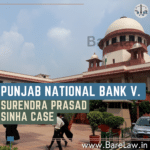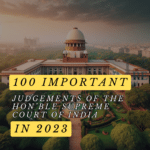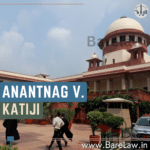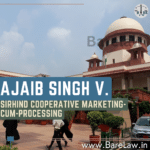Case Brief on
Kuldip Nayar v. Union of India (2006) SC 3127
PRIMARY DETAILS OF THE CASE:

Case Brief on Kuldip Nayar v. Union of India (2006) SC 3127
Introduction:
In India, parliamentary democracy is in use and people are the source of all elections that elect their representatives from their constituencies. Our democracy is regarded as one of the largest democracies globally by considering our population. However, it was not a question about democracy but rather on representation which often found its way to courts for interpretation and opinion. We already know that the Judiciary is the only interpreter of constitution while Supreme Court has jurisdiction over the president and prime minister’s elections. Kuldip Nayar versus Union of India where domicile representation was challenged is one such case dealt in this article. This article discusses it briefly.
Facts of the case:
The petitioner-Kuldip Nayar filed a writ petition challenging amendments made to the Representation of People Act 1951 (henceforth referred to as “the act”) by Amendment 40 of 2003 which came into force on August 28, 2003 through Article 32 of Indian Constitution The said amendment firstly removed an important provision related to the requirement of domicile by a state representative in particular council states. This deletion was alleged to be violative federalism as one among features basic structure Indian constitution by deletion petitioner have taken up this aspect . Petition has also stated that amendment to sections 59, section 94(4) and section 128(2)(b) have introduced an election through open ballot system which violates principle secrecy would upset free fair elections interfere with voter’s freedom speech expression given under Article19 Indian constitution were also called basic framework within four cornersoftheconstitution.Thus matter came before SC issues are framed like this
Issues framed:
By framing below two main issues mainly top court.
Firstly, what does domicile mean and how relevant is it in today’s context?
Secondly, what significance does ‘secrecy’ hold with regard to voting under Indian Constitutional scheme?
Laws involved in the case:
Article 19(1)(2) of the Indian Constitution
Sections 59, 94 and 128 of Representation of People (Amendment) Act, 1951(as amended in the year 2003)
Article 84 of the Indian Constitution.
Contentions:
Mr. Sachar, the petitioner’s counsel, argued that the amendment to section 3 of the Act deleting domicile from the state in essence inflicts upon the federal nature of the Indian Constitution, which is a basic feature of our constitution. He also contended that this aims at transforming India from a constitutional republic into an authentic democracy and destroying equilibrium between union and states. In addition, he stated deletion of “domicile” for a representative would denigrate provisions of the constitution as it goes against some sections in a parliamentary democracy like council of states. As such, he concluded by asserting that through this amendment will take away people in such a state to be represented by such persons from their own states only.
On her part, Ms Vahanvati appearing for the State submitted that these amendments were more necessary than ever before to make up for deficiencies experienced under this law (the court case being discussed). This amendment acts only as one qualification for any member to be both Member of Parliament and Council of States under article 84(c) of the Indian Constitution while non-requirement to be resident or domiciled within any particular constituency would then act as just one qualification alone. She emphasized further that such qualifications should be framed and regulated by parliament but not by the constitution. Lastly, they allude that this could help those states which are not even represented by one member in Parliament. They maintain that there is no constitutional requirement for an elector or resident who happens to become a member.
Decision:
Primarily, was domicile a restraint or is it unconstitutional? In relation thereto it was noted that notwithstanding being more wide-ranging so as to enable electorates outside its territory who can be elected from other places on earth into Rajya Sabha still narrow down even further due to changes brought about by this very clause when compared with what they were before it came into force. The court noted that there was therefore narrowing down done by this amendment in section 3 of the act on the qualifications for a councilmember. This limitation does not apply to all Indians but only aliens, and this is critical according to the opinion of the court. In spite of that, even after that amendment it meets the requirements under article 84 of the Indian Constitution. The other significant aspect highlighted by the court was that even after these amendments are made, they still hold that it is the State Legislative Assembly, through its MLAs, who will elect a representative member into Rajya Sabha. Therefore there is no merit in contention that non-resident person would be taken as domicile when members of legislative assembly (MLAs) belonging to a state elects a member to council of state.
Secrecy was breached by the amendment act in 2003, and the court had to distinguish between ordinary constituency election and proportional representation for it to answer this. Proportional representation occurs when representatives of states elect members into parliament while citizens elect their representatives in constituency elections. Thus, even after the amendment, this contention would not be unconstitutional because it does not infringed on freedom of speech as provided under Article 19(1) (a) of the Indian Constitution. Therefore, open ballot election in indirect elections is not expected to keep secrecy, and taking away secrecy will not affect the right to vote.
Thus, the petitioner’s arguments were dismissed; however, hence the case was dismissed.





